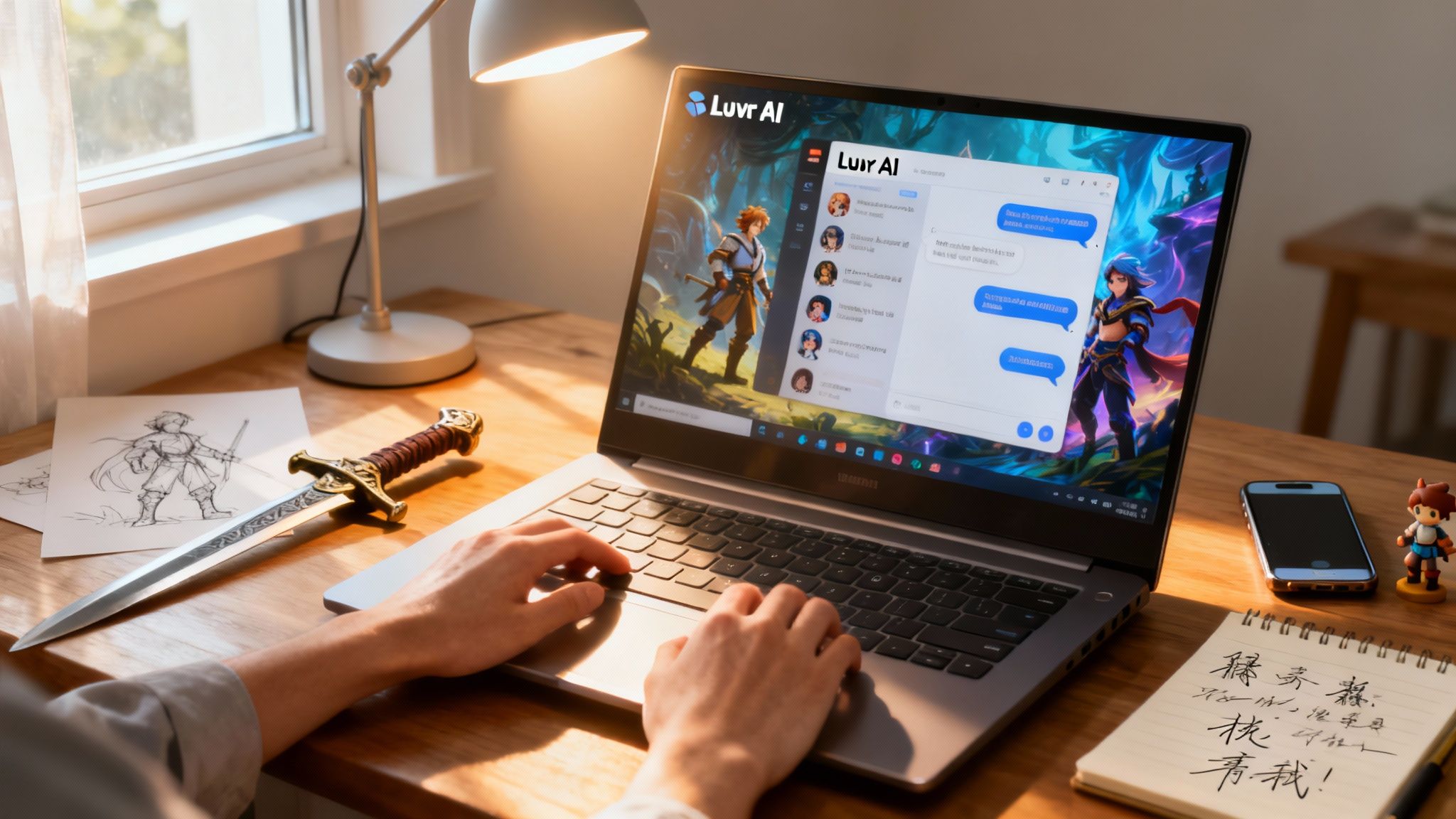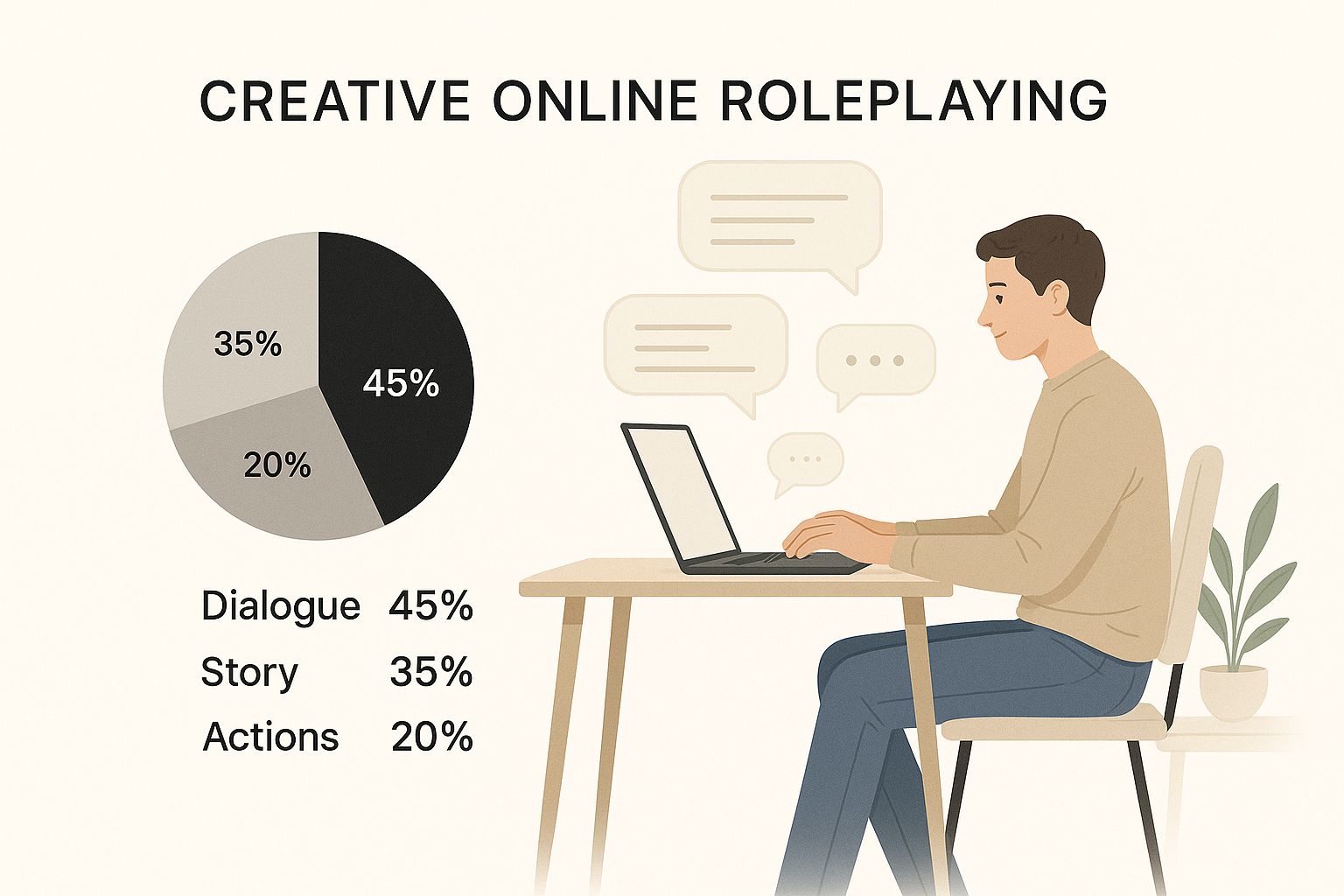Create Your Own AI Girlfriend 😈
Chat with AI Luvr's today or make your own! Receive images, audio messages, and much more! 🔥
4.5 stars

Welcome to the world of collaborative storytelling, where your imagination is the only real limit. To get started, you'll need to choose a platform, create a compelling character, and start writing shared stories with other people in real-time. This guide is your map, taking you from building that first character all the way to mastering the art of the narrative.
Your First Steps into Online Roleplaying
Jumping into online roleplaying feels a lot like opening your favorite book and deciding to write the next chapter yourself. It’s a hobby built on creativity and a shared desire to explore new worlds through the eyes of a character you’ve brought to life. Forget any notion that this is only for die-hard gamers; at its heart, roleplaying is simply interactive storytelling.
The first thing to realize is there’s no single "right" way to do it. You might find your perfect fit in a few different places:
- Text-Based Forums: Think of these as slow-burning, detailed novels you write with others. Players might take days to craft a single, rich response, which is perfect for deep, long-form storytelling.
- Discord Servers: This is a much faster environment. It's built for real-time, spontaneous scenes and is fantastic for building a sense of community.
- MMORPGs: These are visually stunning worlds where you control an avatar and live out your character’s life alongside thousands of other players.
- AI Companions: Platforms like Luvr AI offer a totally different, personalized experience. You can explore stories privately, one-on-one, and at your own speed.
Why People Love to Roleplay
The draw is incredibly personal, but for most of us, it boils down to pure creative freedom. It’s an escape, a social hub, and a powerful way to express yourself, all rolled into one. You get to be someone else for a while—a brave knight, a clever sorcerer, or even just a humble baker in a fantastical town. You aren't just reading a story; you are an active force shaping it.
This infographic captures that feeling perfectly, showing how the creative process unfolds as you bring your stories to life online.

It’s a great visual for how simple text on a screen can blossom into a vibrant, shared narrative. That’s really the heart of it all.
Understanding the Key Ideas
Before you jump in, it helps to get a feel for a few core concepts. These aren't complicated rules, just the fundamental ideas that make collaborative storytelling work.
Core Roleplaying Concepts at a Glance
Understand these fundamental ideas before you jump in.
| Concept | What It Means for You | Why It's Important |
|---|---|---|
| In-Character (IC) | Anything your character says, does, or thinks. It's written from their perspective. | This is where the story lives. Keeping IC separate from your own thoughts is key to staying immersed. |
| Out-of-Character (OOC) | Your real-world comments to other players, usually marked with parentheses or brackets. | OOC is for planning scenes, asking questions, or just chatting. It prevents real-world confusion. |
| Godmodding | Controlling another player's character without their permission (e.g., "I hit you and you fall down."). | It's a major faux pas. Everyone needs control over their own character to keep things fair and fun. |
| Powergaming | Creating a character who is unrealistically powerful, with no weaknesses or flaws. | Flaws make characters interesting and create opportunities for real story development. |
Grasping these ideas from the start will make your interactions much smoother and more enjoyable for everyone involved.
The Scene is Bigger Than You Think
The world of roleplaying is massive and growing fast. The global role-playing games market was valued at around USD 23.2 billion in 2023 and is projected to skyrocket to nearly USD 53.8 billion by 2032. This boom is being driven by mobile gaming, cross-platform play, and new tech that makes the hobby more accessible than ever. You can learn more about the RPG market's growth and see where things are headed.
The best roleplaying experiences come from a simple exchange: you give your partners interesting actions and emotions to react to, and they do the same for you. It’s a creative feedback loop that builds momentum and makes stories unforgettable.
This foundation of mutual creativity is what you’ll carry with you into every scene, no matter which platform you end up calling home.
Finding the Right Roleplaying Community
Your journey into online roleplay starts with one crucial choice: where are you going to tell your stories? This isn't just about picking a website or a game; it's about finding a home for your creativity. The right community can turn a simple hobby into a genuinely rewarding art form, but the wrong one can kill your inspiration fast.
https://www.youtube.com/embed/KLU33-ZwlcM
Making a smart choice means matching a platform’s style and rhythm to your own personality. Each one offers a totally different flavor of collaborative storytelling.
Text-Based Forums and Discord Servers
For those who love getting lost in the details of writing, classic text-based forums are a fantastic starting point. Think of them as slow-burning novels you write with a group. A single post might be polished over a few days, giving you tons of room for rich character development and complex plots. The pace is relaxed, which is perfect for busy people.
Discord servers, on the other hand, are the sprinters of the roleplaying world. They’re all about real-time, rapid-fire interaction. Scenes often unfold in a single evening, creating a dynamic and spontaneous energy that’s hard to beat. If you crave instant feedback and that live-wire feeling of a vibrant community, a Discord server is the place to be.
This is all part of a much bigger picture. Online roleplaying has exploded alongside the global gaming community, which is on track to hit 3.6 billion players by 2025. The entire online gaming market was valued at a staggering USD 208.58 billion in 2024 and is expected to climb to USD 333.20 billion by 2030. This growth is fueled by better internet and more powerful devices everywhere. You can dive into the data on the online gaming market's trajectory to see just how massive this creative space has become.
Immersive Worlds in MMORPGs
Are you a visual person? Massively Multiplayer Online Role-Playing Games (MMORPGs) like Final Fantasy XIV or World of Warcraft offer breathtaking worlds to live in. In these games, you don't just write about your character—you create a physical avatar and live out their life on screen, interacting with thousands of others who are doing the same.
The real magic happens on dedicated roleplaying servers. These communities organize everything from tavern nights and city-wide festivals to sprawling, epic storylines that use the game’s world as a digital stage. It’s a powerful mix of gaming thrills and raw, collaborative creativity.
The Rise of AI Roleplaying Platforms
A newer, and frankly fascinating, option is the world of AI roleplaying. Platforms like Luvr AI offer something completely different: a private, personalized experience that’s ready whenever you are. Instead of coordinating with other people, you interact with an intelligent AI companion designed to adapt to your story on the fly.
This is an absolute game-changer for a few types of roleplayers:
- The Experimenter: If you're new and want to practice without feeling judged, an AI partner is the perfect, pressure-free sandbox.
- The Solo Storyteller: Have a very specific story in mind? With an AI, you don't have to compromise your vision to fit a group.
- The Time-Crunched Player: You can jump in for ten minutes or three hours. The story waits for you, with no need to schedule sessions with anyone.
AI platforms get rid of the social friction that can sometimes derail traditional roleplay. No scheduling conflicts, no creative disagreements—just pure, uninterrupted storytelling that bends to your will.
This approach gives you complete narrative control, offering a level of personalization that’s almost impossible to find in a group setting.
How to Choose Your Perfect Fit
So, how do you pick? It really boils down to knowing what you want out of the experience. Are you looking for deep, literary collaboration or fast, social fun? Do you prefer a visual backdrop for your stories, or the limitless freedom of a "theater of the mind" where anything is possible?
Let's break it down to make your decision easier.
Comparing Popular Roleplay Platforms
A practical breakdown to help you decide where to start your adventure.
| Platform Type | Ideal For | What to Expect | Potential Downsides |
|---|---|---|---|
| Forums | Detailed, long-form writers with patience. | Slow, thoughtful pacing and novel-quality posts. | Can feel very slow; stories may stall if players disappear. |
| Discord | Social, fast-paced players who enjoy real-time chat. | Quick, dynamic scenes and a strong community feel. | Can be overwhelming; harder to build deep, long-term plots. |
| MMORPGs | Visual players who enjoy gaming and world exploration. | An immersive visual setting and large-scale community events. | Creative freedom is limited by the game's mechanics and assets. |
| AI Platforms | Solo players, beginners, and those with limited time. | Total creative control, privacy, and 24/7 availability. | Lacks the spontaneous, unpredictable spark of another human. |
Ultimately, there’s no single "best" way to roleplay online. The perfect community is the one that sets your imagination on fire and makes you excited to log back in. Don't be afraid to test-drive a few different options until you find the place that finally feels like home.
Creating a Character People Actually Want to Know
Let’s be honest, your character is everything in roleplay. They’re your avatar, your voice, and the single most important tool you have for plugging into a shared story. A truly great character feels alive. They make decisions that aren’t just about winning, but about who they are, pulling other players into their world and pushing the story in directions no one saw coming.
This is all about getting past the generic. Anyone can roll a stoic warrior or a wisecracking rogue. But what makes one stick in your memory? It's the little things—the quirks, the hidden fears, the weird passions that make them feel like a real, breathing person.

Building Beyond the Archetype
First things first: think beyond the basic class. "Wizard" is a job description, not a personality. You have to dig a little deeper. Where are they from? What were their parents like? What’s the one event from their past that completely rewired their brain?
And please, don't just tack on a tragic backstory for cheap drama. Think about how their history actually shows up in their day-to-day life. Maybe a character who grew up starving is now neurotically frugal, or maybe they swing the other way and spend money like it’s on fire. A former soldier might jump at loud noises or find it impossible to get close to people.
When you connect their past to their present, their actions suddenly have weight. Other players won't just see a random outburst; they'll understand the why behind it because you’ve already laid the groundwork.
The Magic Is in Motivations and Flaws
A memorable character is a tug-of-war between two things: what they desperately want and what’s standing in their own way. A clear goal gives your character a reason to get out of bed in the morning, while a real, meaningful flaw makes them relatable and gives them room to grow.
Think about pairings like these:
Motivation: A disgraced knight is obsessed with restoring their family's honor.
Flaw: Their crippling pride means they'd rather die than ask for help.
Motivation: A thief dreams of pulling one last job to escape their life of crime.
Flaw: They have a total soft spot for the underdog and keep giving their score away, trapping them in the very life they want to leave.
See? These aren't just personality quirks; they're built-in story generators. The tension between what a character wants and what their flaws prevent them from getting is where the best roleplay lives. If you're looking to play around with these kinds of complex personalities, using an AI character builder can be an awesome way to sandbox ideas and flesh out these internal conflicts.
A perfect character is a boring character. Flaws aren't a weakness in your character design; they're the hooks that make the story catch. They create problems, force tough choices, and give your partners something real to grab onto.
Honestly, flaws are what make a hero truly heroic. Watching someone overcome a deep-seated personal failing is way more compelling than watching them kill another dragon.
Use Questionnaires to Find the Gold
Sometimes the best details pop up when you're not even looking for them. Character questionnaires are fantastic for this because they make you think about stuff you'd normally gloss over. Don't just fill one out and forget it—let the answers bleed into your roleplay.
Here are a few questions that always seem to uncover some hidden gems:
- What’s their most prized possession, and what’s the story behind it?
- What’s a small, almost silly fear they have (spiders, clowns, public speaking)?
- What’s a lie they tell themselves almost every day?
- Who is the one person they would burn the world down to protect?
- What does a “perfect day” look like from their perspective?
Discovering that your hardened mercenary's most treasured item is a worn-out kid's book their sister gave them? That's instant depth. It gives them a vulnerability, a soft spot that makes them so much more interesting than a simple wall of muscle and steel.
Finding Their Voice
Finally, think about how your character moves through the world. Their "voice" isn't just about how they talk; it's their posture, their nervous tics, their entire vibe.
- Physicality: Do they slouch or stand ramrod straight? Are they constantly making eye contact, or do they find the floor fascinating? Maybe they fiddle with a coin when they're thinking. Describing these little physical tells can say so much more than a block of dialogue.
- Speech Patterns: Are they a fast-talker who uses big words, or are they blunt and to the point? Do they have a regional accent or use slang nobody else understands?
- Internal vs. External: This is a big one. What’s the difference between what your character is thinking and what they’re actually saying? That gap right there is a goldmine for dramatic tension.
Pull all these pieces together, and you don't just have a concept anymore. You have a character. You'll have someone you’re excited to play and, just as importantly, someone your partners are dying to meet.
Mastering the Art of Collaborative Storytelling
Let's get one thing straight: great roleplay is a dance, a creative back-and-forth between you and your partners. It's not a monologue you perform for a silent audience. The real magic happens when you stop just writing about your character and start creating opportunities for others to engage with them.
Think of every post as an invitation.
Before you hit send, ask yourself the most important question in all of collaborative writing: "What can my partner do with this?" If the answer is "not much," you've got a dead-end post. It's time for a quick rewrite. You're building this world together, brick by brick, and every post is a new brick you’re handing over.
Show, Don’t Tell: Painting Vivid Pictures
This is the golden rule you’ve heard a thousand times, and for good reason. It's the skill that separates the good from the truly great. Telling is lazy; showing is immersive. It’s the difference between stating a fact and creating an experience.
Don't just write, "My character was angry." That tells me nothing. Instead, show me what that anger looks like.
- "His knuckles flashed white as he gripped the arm of his chair, the old leather groaning under the strain."
- "A single muscle in his jaw twitched. When he finally spoke, his voice was a low, dangerously calm rumble that was far more terrifying than a shout."
See the difference? These descriptions give your partners real, sensory details to react to—the sound of straining leather, the sight of a clenched jaw, a chilling shift in tone. This is how you create an interactive scene instead of just narrating it.
Crafting Posts That Drive the Story Forward
A fantastic post always leaves a door open for someone else to walk through. It propels the story by giving your partners something tangible to grab onto, often called "giving a hook." Your writing needs to be generous.
Look at the difference between a post that stalls the scene and one that fuels it:
| Type of Post | The Dead End (Avoid This) | The Generous Hook (Do This) |
|---|---|---|
| Dialogue | "Okay," she said. | "Okay," she said, her eyes flicking to the sealed envelope on the table. "But what's in there?" |
| Action | He walked across the room. | He walked across the room, stopping to deliberately trace the strange sigil carved into the floorboards. |
| Emotion | She felt sad. | A single tear cut a clean path through the grime on her cheek as she stared at the faded photograph in her hand. |
The "generous" examples are worlds better because they provide clear prompts. They introduce a question, a mystery, or an emotional cue that practically begs for a response. That collaborative spirit is what keeps the momentum going.
The Unwritten Rules of Roleplay Etiquette
Beyond the writing itself, good roleplay is built on a foundation of mutual respect. A few key "unwritten rules" ensure the experience stays fair and fun for everyone. Ignore them, and you'll quickly find your scenes drying up.
The core principle is simple: You only control your character. Their thoughts, feelings, and actions are yours. Everything and everyone else belongs to your partners or the person running the game.
Breaking this rule leads to two of the biggest sins in roleplaying:
- God-Modding: This is when you take control of another person's character without their permission. Writing things like, "My sword strike connects with your arm, sending you stumbling back" is a huge no-no. You decide the attempt, they decide the outcome. Taking away their agency is the fastest way to kill a scene.
- Meta-Gaming: This is using out-of-character knowledge to give your character an in-character advantage. For instance, if you read another player's profile and learn their character has a secret fear of spiders, having your character suddenly conjure spiders is meta-gaming. It breaks immersion and just feels cheap.
Avoiding these pitfalls is how you build trust and show respect for your fellow writers. Whether you're in an intense one-on-one scene or a sprawling group plot, fairness is the glue that holds the story together. If you want a safe space to practice these skills, experimenting with an AI character chat can be a fantastic way to sharpen your writing without the pressure of a live partner.
Staying Safe While You Roleplay

Getting lost in a good story is the goal, but your real-world safety and comfort should always be your top priority. Think of digital safety less as a list of rules and more as the foundation for incredible storytelling. When you feel secure, you can let your creativity run wild without holding back.
Your best friend in all of this is clear Out-of-Character (OOC) communication. This is just you, the writer, talking directly to your partners. A quick OOC chat before a scene gets going is the perfect time to get on the same page about expectations and boundaries.
Set Your Boundaries Before You Start
Before you even type your first in-character line, take a minute to talk about what you are and aren't comfortable with. I promise, it's not awkward—it's what experienced roleplayers do to show respect and make sure everyone has a good time. A simple conversation can head off so many potential misunderstandings down the road.
Here are a few things you’ll want to cover:
- Themes and Limits: Are there any topics you just don't want to touch? Be clear about your "hard nos" (things that are completely off the table) and your "soft limits" (topics you're okay with, but maybe only in small doses).
- Pacing and Availability: How often do you usually post? Giving your partners a heads-up about your general availability takes the pressure off. Nobody wants to feel like they need to be online 24/7.
- In-Character vs. Out-of-Character: It’s a good idea to confirm that any conflict between characters is just part of the story. A quick OOC message like, "Hey, just so you know, my character is furious right now, but I'm having a blast writing this!" keeps things fun and light.
This kind of proactive chat is a sign of a healthy, mature roleplaying space. Even when you're exploring things privately, like using an NSFW AI chat, knowing your own boundaries is absolutely key to having a positive experience.
Guard Your Personal Information
Keeping your real life separate from your character's is non-negotiable. Your online persona doesn't need any connection to your actual identity. Never, ever share sensitive details like your real name, address, phone number, or where you work.
This isn't just about protecting your privacy; it helps keep the story immersive. Use a dedicated email and username for your roleplaying accounts—something that doesn't link back to your personal social media or professional life. This creates a safe buffer, letting you engage with the story without putting your security at risk.
Your personal safety comes first, always. Trust your gut. If another person or a whole community makes you feel pressured, uncomfortable, or unsafe for any reason, you have every right to walk away. No explanation needed.
Know the Red Flags and When to Bail
Most online roleplaying communities are fantastic and welcoming, but it always pays to be observant. Learning to spot potential red flags early can save you from a genuinely bad experience.
Keep an eye out for these warning signs:
- Pushing Boundaries: If someone repeatedly ignores the limits you’ve set or dismisses your concerns, that’s a huge red flag.
- Prying for Personal Details: A weirdly persistent or invasive interest in your real life is completely inappropriate and crosses a major line.
- Constant OOC Drama: Communities that seem to be in a constant state of out-of-character arguments are often unstable and just plain stressful to be a part of.
This hobby has its roots in tabletop role-playing games (TTRPGs), where mutual fun and respect have always been the name of the game. That tradition is alive and well—the TTRPG market was valued at USD 1,925.67 million in 2024 and is expected to climb to over USD 4.7 billion by 2032. It's a huge testament to the power of positive, community-based storytelling.
At the end of the day, your well-being is what matters most. Find a community that respects boundaries and prioritizes clear communication, and you'll unlock a safe and incredibly rewarding roleplaying journey.
Answering Your Biggest Online Roleplaying Questions
Even with the best prep, jumping into online roleplaying for the first time can feel a little intimidating. There's a whole new world of etiquette and jargon to learn. Let's tackle some of the most common questions that pop up for newcomers, so you can feel confident stepping into your first scene.
The first thing you'll notice is the lingo. You'll see acronyms like LFRP (Looking for Roleplay) or terms like "lore" (the official backstory of the world). Don't sweat it. Nobody expects you to know everything on day one, and most roleplayers are more than happy to explain their community's slang if you just ask.
"How Long Should My Posts Be?"
Ah, the million-dollar question. The honest answer? It really, truly depends on where you're roleplaying. There's no one-size-fits-all rule for post length.
- Forums: These platforms often lean toward longer, multi-paragraph posts. Think "para" or even "novella" style, where quality and detail are prized over speed.
- Discord: Here, the vibe is usually much faster. Posts are often a single paragraph, or sometimes just a few sentences, to keep the real-time conversation moving.
- MMORPGs: In-game chat is built for speed. Replies are almost always short, snappy, and focused on action.
The best thing you can do is just watch for a bit. When you join a new group, spend some time reading the existing roleplay threads. We call this "lurking," and it’s the perfect way to get a feel for the group’s rhythm and expectations before you make your first move.
Remember, the goal isn't just to write a lot. It's to write enough to move the story forward and give your partner something interesting to work with. A single, powerful sentence often hits harder than five paragraphs of fluff.
"What if I Make a Mistake?"
You will. I guarantee it. And that's perfectly fine! Everyone messes up, from seasoned veterans to total beginners. You might break character by accident or get a plot detail wrong. What matters is how you handle it.
For most little slip-ups, a quick OOC (Out-of-Character) message is all you need.
Let's say you misread the scene and had your character react to something they couldn't possibly have known. Just shoot a quick message like, ((OOC: Whoops, my bad! I missed that detail. Let me edit that last post real quick.)) It shows you're paying attention and you respect the story you're building together. A little humility goes a long way.
"How Do I Find People to Roleplay With?"
Finding the right partner is everything. This is where the magic happens. Most platforms have dedicated forums or channels just for this. Keep an eye out for posts tagged with LFRP, where people will pitch the kinds of stories and characters they're hoping to find.
When you put yourself out there, be specific. Give people a reason to be excited to write with you. Don't just say, "Anyone want to roleplay?"
Weak: "LFRP with my knight character."
Strong: "Seeking an adventure! My newly sworn knight, Ser Kaelen, is looking for a guide to help him navigate the treacherous Whisperwood. Open to plots involving mystery, survival, or forgotten ruins."
See the difference? The second example gives potential partners a real hook. It shows you've thought about your character and you're ready to build a story. Finding a great partner is about proving you'll be a generous and creative collaborator.
Ready to create a character and explore a world with no limits? At Luvr AI, you can design your ideal AI companion and jump into unique, personalized roleplaying scenarios anytime you want. Start your story today at Luvr AI.



